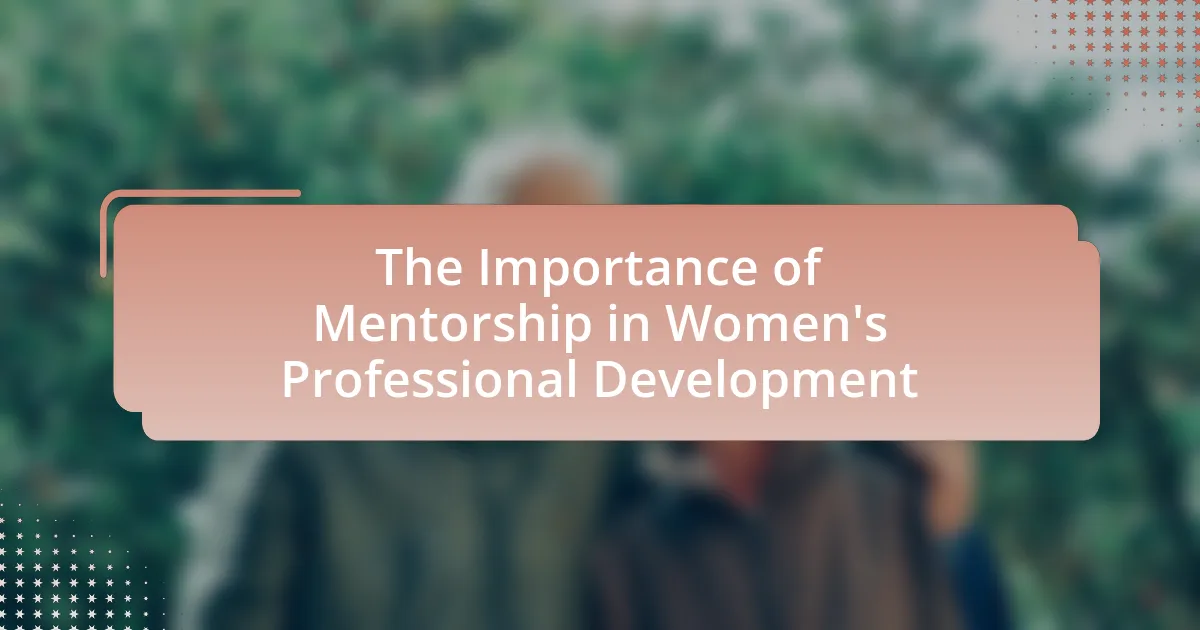The main entity of the article is mentorship and its significance in women’s professional development. The article outlines how mentorship provides essential guidance, support, and networking opportunities that enhance women’s career advancement, particularly in male-dominated fields. It discusses the positive impact of mentorship on job satisfaction, confidence, and leadership skills, while also addressing the barriers women face in professional environments. Key components of effective mentorship, various types of mentorship available, and strategies for women to seek and maintain mentorship relationships are explored, along with the role of organizations in fostering mentorship programs to promote gender equality and diversity in the workplace.
What is the Importance of Mentorship in Women’s Professional Development?
Mentorship is crucial for women’s professional development as it provides guidance, support, and networking opportunities that enhance career advancement. Research indicates that women with mentors are more likely to receive promotions and salary increases compared to those without mentorship. A study by the American Psychological Association found that mentorship can lead to increased job satisfaction and improved performance, particularly for women in male-dominated fields. Additionally, mentorship fosters confidence and helps women navigate workplace challenges, ultimately contributing to greater representation of women in leadership roles.
How does mentorship influence women’s career trajectories?
Mentorship significantly influences women’s career trajectories by providing guidance, support, and networking opportunities that enhance professional growth. Research indicates that women with mentors are more likely to receive promotions and salary increases compared to those without mentorship. For instance, a study published in the Journal of Vocational Behavior found that women with mentors reported higher job satisfaction and career advancement, highlighting the critical role mentorship plays in overcoming barriers in male-dominated industries. Additionally, mentorship fosters skill development and confidence, enabling women to navigate challenges and seize opportunities effectively.
What are the key components of effective mentorship for women?
The key components of effective mentorship for women include supportive relationships, goal setting, and skill development. Supportive relationships foster trust and open communication, allowing mentees to share challenges and seek guidance. Goal setting helps mentees define their career aspirations and create actionable plans, while skill development focuses on enhancing competencies relevant to their fields. Research indicates that women with mentors are more likely to advance in their careers, as mentorship provides critical networking opportunities and access to resources that can facilitate professional growth.
How does mentorship impact women’s confidence and leadership skills?
Mentorship significantly enhances women’s confidence and leadership skills by providing guidance, support, and role modeling. Research indicates that women with mentors report higher self-esteem and greater career advancement opportunities. For instance, a study published in the Journal of Vocational Behavior found that women who engaged in mentoring relationships experienced increased confidence in their abilities and improved leadership competencies. This is attributed to the personalized feedback and encouragement received from mentors, which helps women navigate challenges and develop essential skills for leadership roles.
Why is mentorship particularly crucial for women in the workplace?
Mentorship is particularly crucial for women in the workplace because it provides guidance, support, and networking opportunities that are often less accessible to them. Women frequently face barriers such as gender bias and a lack of representation in leadership roles, which can hinder their career advancement. Research indicates that women with mentors are more likely to receive promotions and salary increases; for instance, a study by the American Psychological Association found that women with mentors are 20% more likely to advance in their careers compared to those without. This support system helps women navigate challenges, build confidence, and develop essential skills, ultimately contributing to a more equitable workplace.
What barriers do women face in professional environments that mentorship can address?
Women face several barriers in professional environments, including gender bias, lack of access to networks, and limited opportunities for advancement. Mentorship can address these barriers by providing guidance, support, and access to influential networks. For instance, research from McKinsey & Company indicates that women are less likely to receive sponsorship compared to their male counterparts, which can hinder their career progression. Mentorship helps bridge this gap by connecting women with experienced professionals who can advocate for them and provide critical career insights. Additionally, a study published in the Journal of Vocational Behavior found that mentorship positively impacts women’s confidence and career satisfaction, further enabling them to overcome workplace challenges.
How does mentorship help in overcoming gender biases in the workplace?
Mentorship helps in overcoming gender biases in the workplace by providing women with guidance, support, and advocacy from experienced professionals. This relationship fosters confidence and skill development, enabling women to navigate workplace challenges more effectively. Research indicates that women with mentors are more likely to receive promotions and salary increases, as mentors often advocate for their mentees in decision-making processes. For instance, a study by Catalyst found that women with mentors are 25% more likely to advance in their careers compared to those without. This demonstrates that mentorship not only empowers women but also actively works to dismantle systemic biases by promoting equitable opportunities.
What are the different types of mentorship available for women?
There are several types of mentorship available for women, including formal mentorship, informal mentorship, peer mentorship, group mentorship, and reverse mentorship. Formal mentorship typically involves structured programs where a mentor and mentee are paired based on specific goals and objectives, often facilitated by organizations or institutions. Informal mentorship occurs naturally through personal relationships and networking, allowing women to seek guidance from experienced individuals in their field. Peer mentorship involves women at similar career stages supporting each other, fostering mutual growth and learning. Group mentorship brings together multiple mentees with one or more mentors, promoting diverse perspectives and shared experiences. Reverse mentorship flips the traditional model, where younger or less experienced women mentor more senior professionals, often focusing on contemporary issues like technology and social media. Each type of mentorship plays a crucial role in enhancing women’s professional development by providing support, guidance, and opportunities for growth.
What is the difference between formal and informal mentorship?
Formal mentorship is a structured relationship typically established by organizations, where a mentor and mentee are paired based on specific goals and objectives. In contrast, informal mentorship arises organically, often based on personal connections or shared interests, without a formal framework or defined expectations. Research indicates that formal mentorship programs can lead to measurable career advancements, while informal mentorship often provides emotional support and networking opportunities, highlighting the distinct yet complementary roles both types play in professional development.
How can peer mentorship benefit women’s professional growth?
Peer mentorship can significantly benefit women’s professional growth by providing support, guidance, and networking opportunities. Women engaged in peer mentorship often experience enhanced confidence and skill development, as they share experiences and strategies for overcoming workplace challenges. Research indicates that women who participate in mentorship programs report higher job satisfaction and career advancement. For instance, a study published in the Journal of Vocational Behavior found that women with mentors are more likely to receive promotions and salary increases compared to those without mentorship. This demonstrates that peer mentorship not only fosters personal development but also contributes to tangible career outcomes for women.

What are the benefits of mentorship for women in their careers?
Mentorship provides significant benefits for women in their careers, including enhanced professional development, increased confidence, and improved networking opportunities. Research indicates that women with mentors are more likely to receive promotions and salary increases compared to those without mentorship. A study by the American Psychological Association found that women who engage in mentorship programs report higher job satisfaction and career advancement. Additionally, mentorship fosters a supportive environment that encourages women to navigate workplace challenges effectively, ultimately leading to greater representation of women in leadership roles.
How does mentorship contribute to skill development for women?
Mentorship significantly contributes to skill development for women by providing guidance, support, and access to networks that enhance their professional capabilities. Research indicates that women with mentors are more likely to receive promotions and salary increases, as mentorship fosters essential skills such as leadership, negotiation, and strategic thinking. A study by the American Psychological Association found that mentees report higher levels of job satisfaction and career advancement, demonstrating the tangible benefits of mentorship in developing critical skills.
What specific skills can women gain through mentorship programs?
Women can gain specific skills such as leadership, networking, communication, and problem-solving through mentorship programs. These programs provide opportunities for women to learn from experienced mentors who share insights and strategies for navigating professional challenges. Research indicates that women who participate in mentorship programs often report enhanced confidence and improved decision-making abilities, which are critical for career advancement. For instance, a study by the American Psychological Association found that mentorship significantly boosts self-efficacy and career satisfaction among women in the workplace.
How does mentorship enhance networking opportunities for women?
Mentorship enhances networking opportunities for women by providing access to established professional networks and facilitating connections with influential individuals. Mentors often introduce their mentees to key contacts within their industry, which can lead to new job opportunities, collaborations, and partnerships. Research indicates that women with mentors are more likely to receive promotions and have higher salaries, as they benefit from the mentor’s guidance and connections. For instance, a study by the American Psychological Association found that mentorship significantly increases women’s visibility in their fields, thereby expanding their professional networks and enhancing career advancement.
What role does mentorship play in promoting diversity and inclusion?
Mentorship plays a crucial role in promoting diversity and inclusion by providing guidance, support, and opportunities for underrepresented groups. Mentors can help individuals navigate professional environments, build networks, and develop skills that are essential for career advancement. Research indicates that mentorship programs significantly increase the representation of women and minorities in leadership positions; for instance, a study by the American Psychological Association found that mentees are more likely to receive promotions and salary increases compared to those without mentors. This demonstrates that effective mentorship not only fosters individual growth but also contributes to a more diverse and inclusive workplace culture.
How can mentorship programs be designed to support diverse women?
Mentorship programs can be designed to support diverse women by incorporating tailored training, inclusive recruitment of mentors, and creating safe spaces for dialogue. Tailored training ensures that mentors understand the unique challenges faced by women from various backgrounds, such as cultural biases and systemic barriers. Inclusive recruitment of mentors involves actively seeking individuals from diverse backgrounds to reflect the mentees’ experiences, which fosters relatability and trust. Creating safe spaces for dialogue allows diverse women to share their experiences and challenges openly, promoting a supportive environment that encourages growth and development. Research indicates that mentorship significantly enhances career advancement for women, particularly those from underrepresented groups, highlighting the necessity of these design elements in effective mentorship programs.
What impact does mentorship have on organizational culture regarding gender equality?
Mentorship significantly enhances organizational culture regarding gender equality by fostering an inclusive environment that supports women’s professional growth. Mentors provide guidance, advocate for their mentees, and help navigate workplace challenges, which can lead to increased representation of women in leadership roles. Research from McKinsey & Company indicates that organizations with strong mentorship programs see a 30% increase in the likelihood of women advancing to managerial positions compared to those without such programs. This demonstrates that effective mentorship not only empowers individual women but also contributes to a cultural shift towards greater gender equality within organizations.
What challenges do women face in finding and maintaining mentorship relationships?
Women face several challenges in finding and maintaining mentorship relationships, primarily due to systemic barriers, lack of representation, and social dynamics. Systemic barriers include gender biases in professional environments that can limit women’s access to mentors, as studies show that women are often underrepresented in leadership roles, making it difficult for them to find mentors who can relate to their experiences. Additionally, women may encounter difficulties in establishing connections with potential mentors due to networking challenges, as research indicates that women often have smaller professional networks compared to their male counterparts. Social dynamics also play a role; women may face skepticism or lack of support from peers and mentors, which can hinder their ability to maintain these relationships. These factors collectively contribute to the challenges women experience in both finding and sustaining mentorship opportunities.
How can women effectively seek out mentors in their fields?
Women can effectively seek out mentors in their fields by identifying potential mentors within their professional networks and actively engaging with them. This involves researching individuals who have relevant experience and success in the desired field, attending industry events, and utilizing platforms like LinkedIn to connect. A study by the American Psychological Association found that mentorship significantly enhances career advancement, particularly for women, highlighting the importance of establishing these relationships. By approaching potential mentors with specific questions or requests for guidance, women can demonstrate their commitment and foster meaningful connections that can lead to valuable mentorship opportunities.
What strategies can women use to sustain mentorship relationships over time?
Women can sustain mentorship relationships over time by actively engaging in regular communication, setting clear goals, and showing appreciation for their mentors. Regular communication fosters a sense of connection and allows for ongoing dialogue about professional development. Setting clear goals helps both the mentor and mentee understand the purpose of their relationship and track progress. Showing appreciation, such as expressing gratitude or providing updates on achievements, reinforces the value of the mentor’s guidance. Research indicates that sustained mentorship relationships often thrive on mutual respect and commitment, which are cultivated through these strategies.
How can organizations support mentorship for women’s professional development?
Organizations can support mentorship for women’s professional development by establishing structured mentorship programs that connect women with experienced mentors in their fields. These programs can include formal training for mentors to enhance their skills in guiding and supporting mentees effectively. Research indicates that women who have mentors are more likely to advance in their careers; for instance, a study by the American Psychological Association found that mentorship significantly contributes to women’s career satisfaction and advancement. Additionally, organizations can create networking opportunities and provide resources that facilitate ongoing mentorship relationships, ensuring that women have access to the guidance and support necessary for their professional growth.
What initiatives can companies implement to foster mentorship programs?
Companies can implement structured mentorship programs that pair experienced employees with less experienced ones to foster professional development. These programs can include regular training sessions for mentors, clear guidelines on mentorship goals, and opportunities for mentees to engage in networking events. Research indicates that mentorship can significantly enhance career advancement, particularly for women, as evidenced by a study from the American Psychological Association showing that women with mentors are more likely to receive promotions and salary increases. Additionally, companies can utilize technology platforms to facilitate mentor-mentee matching based on skills and career aspirations, further enhancing the effectiveness of these initiatives.
How can organizations measure the success of their mentorship programs?
Organizations can measure the success of their mentorship programs through various quantitative and qualitative metrics. Key performance indicators (KPIs) such as participant satisfaction surveys, retention rates of mentees, and career advancement statistics provide concrete data on program effectiveness. For instance, a study by the American Society for Training and Development found that 75% of executives credit mentorship as a key factor in their career success, highlighting the impact of mentorship on professional development. Additionally, tracking the number of promotions or salary increases among mentees compared to non-mentees can further validate the program’s success.
What resources are essential for effective mentorship initiatives?
Effective mentorship initiatives require structured programs, trained mentors, and accessible resources. Structured programs provide a clear framework for mentorship, ensuring that goals and expectations are defined. Trained mentors possess the necessary skills to guide mentees effectively, fostering a supportive environment. Accessible resources, such as training materials and networking opportunities, enhance the mentorship experience by providing additional support and knowledge. Research indicates that organizations with formal mentorship programs see a 20% increase in employee retention, highlighting the importance of these resources in creating successful mentorship initiatives.
What best practices should women follow to maximize their mentorship experiences?
Women should actively engage in open communication with their mentors to maximize their mentorship experiences. This involves setting clear goals, asking for feedback, and being receptive to constructive criticism. Research indicates that effective communication enhances the mentor-mentee relationship, leading to better career outcomes. For instance, a study published in the Journal of Vocational Behavior found that mentees who communicated their aspirations and challenges effectively reported higher satisfaction and success in their careers. Additionally, women should seek mentors who align with their professional goals and values, as this alignment fosters a more meaningful and productive mentorship experience.
How can women prepare for mentorship meetings to gain the most value?
Women can prepare for mentorship meetings by setting clear objectives and conducting thorough research on their mentor’s background and expertise. Establishing specific goals allows women to focus the discussion on areas that will provide the most value, such as career advancement or skill development. Researching the mentor’s professional journey, achievements, and interests enables women to tailor their questions and topics for discussion, fostering a more engaging and productive conversation. According to a study published in the Journal of Vocational Behavior, individuals who set clear goals for mentorship interactions report higher satisfaction and perceived value from the experience.
What are the key qualities women should look for in a mentor?
Women should look for mentors who possess experience, empathy, and strong communication skills. Experience ensures that the mentor has relevant knowledge and insights to share, which can guide women in navigating their careers effectively. Empathy allows the mentor to understand the unique challenges women face in professional environments, fostering a supportive relationship. Strong communication skills are essential for conveying advice clearly and providing constructive feedback. Research indicates that mentorship significantly impacts women’s career advancement, highlighting the importance of these qualities in fostering effective mentorship relationships.
What are the common pitfalls to avoid in mentorship relationships?
Common pitfalls to avoid in mentorship relationships include lack of clear communication, unrealistic expectations, and insufficient commitment from either party. Clear communication is essential for setting goals and understanding needs; without it, misunderstandings can arise, leading to frustration. Unrealistic expectations can create pressure and disappointment, as mentors and mentees may have different visions of the relationship’s outcomes. Additionally, insufficient commitment can result in a lack of follow-through on both sides, undermining the relationship’s effectiveness. Research indicates that mentorship relationships thrive on mutual engagement and clarity, highlighting the importance of addressing these pitfalls to foster successful outcomes.
How can women navigate conflicts or misunderstandings with mentors?
Women can navigate conflicts or misunderstandings with mentors by engaging in open and honest communication. This approach allows women to express their concerns and clarify any misinterpretations directly with their mentors. Research indicates that effective communication is crucial in mentorship relationships, as it fosters trust and understanding, which are essential for resolving conflicts. For instance, a study published in the Journal of Vocational Behavior highlights that mentees who proactively address issues with their mentors report higher satisfaction and better outcomes in their professional development. By actively listening and seeking feedback, women can also demonstrate their commitment to the mentorship process, further strengthening the relationship.
What should women do if their mentorship relationship is not beneficial?
Women should reassess their mentorship relationship and consider seeking a new mentor if it is not beneficial. This involves evaluating the current mentor’s ability to provide guidance, support, and opportunities for growth. If the relationship lacks these essential elements, women can actively seek out mentors who align better with their professional goals and values. Research indicates that effective mentorship significantly contributes to career advancement, highlighting the importance of a supportive relationship. Therefore, prioritizing a beneficial mentorship experience is crucial for women’s professional development.


